#he is not the villain the filmmakers portrayed him as :')
Explore tagged Tumblr posts
Text
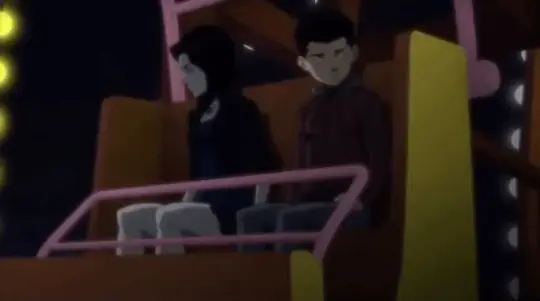
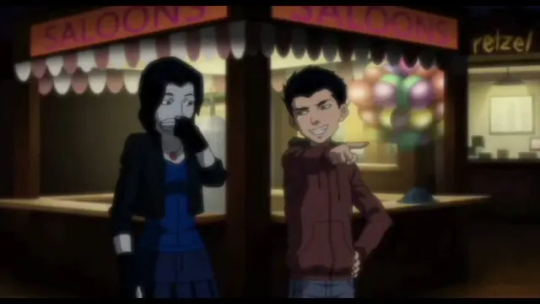
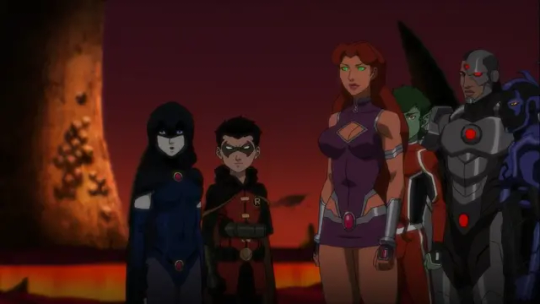
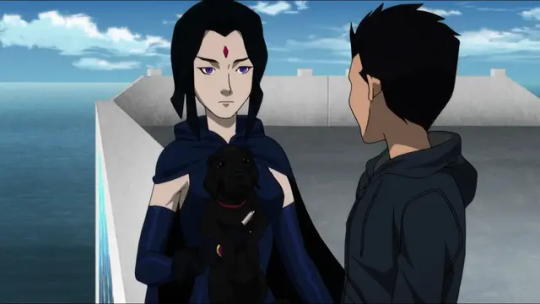


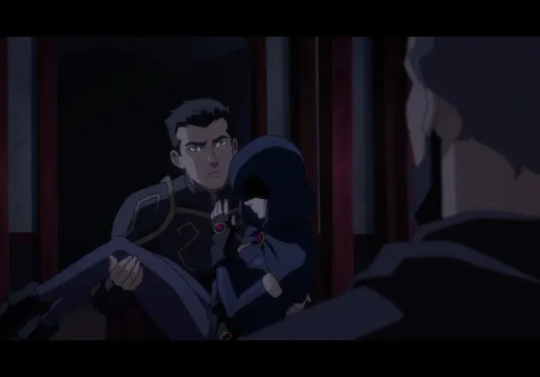
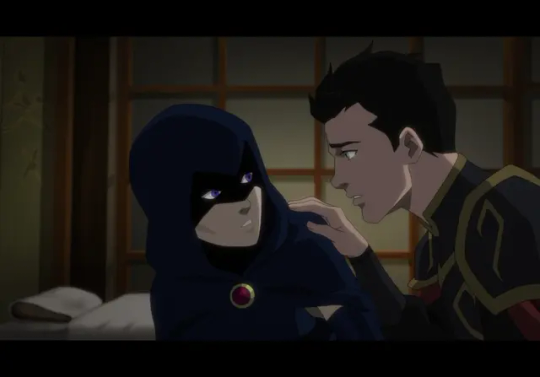

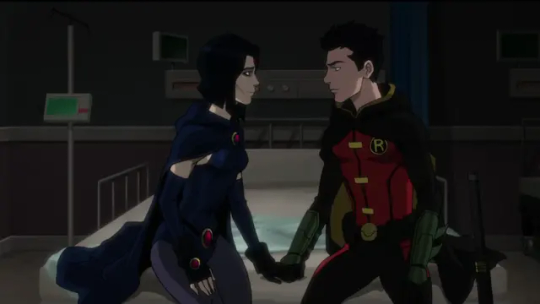
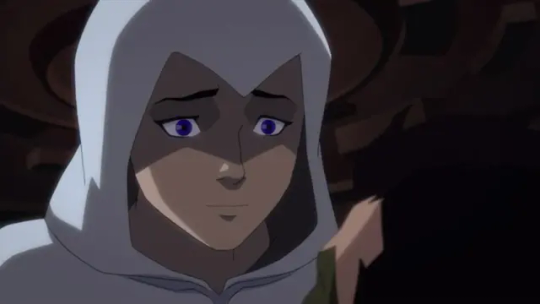
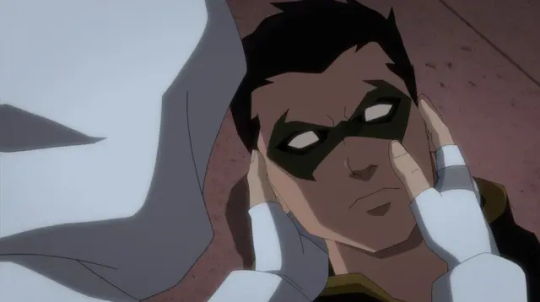
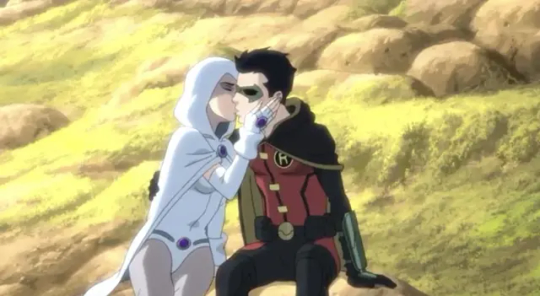
Sorry to use screencaps for attention, but hey, if you don't like the words, the images are still brilliant and beautiful.
Anyway, it's half a decade since Apokolips War, which was quite divisive, and I understand why. It went hard on the misery and loss angle, then ended on the ultimate downer ending where the heroes win, but they still lost.
*Aside*
Has the antagonist winning in the first part of the narrative, him being defeated in the finale, but even the triumph involved significant loss; the filmmakers wanted to mirror The Flashpoint Paradox, since it had the mutilation and deaths of many until a complete erasure of the universe.
Pardon this self-indulgent tangent, I would have split AW into two movies; first film of the final Apokolips War being the initial preparation and invasion of Apokolips, maybe some other subplots too, then ending with the Paradoom decimation, and part two being most of the movie as it was, if expanded to fill time lost by dividing. Also, solve the last problem with magic instead - Constantine could use a forbidden spell to restore the universe, which would still piss off the Spectre, thus carrying him into the Tomorrowverse (although, I do understand the thematic symmetry with a universe that began with a Flashpoint, ending with one).
*Main subject*
Despite Apokolips War perhaps being too grim and maybe gratuitous with the violence, overall it was generally exceptional, with it closing numerous plot threads of the DC Animated Movie Universe (albeit, some probably warranted further development), however, I'm probably obligated to love it in some ways as it had the culmination of the relationship between Damian Wayne and Raven, which was the most unexpected, yet most enthralling and best developed.
Yet I think there was an issue inherent in Apokolips War, that is it ended the DCAMU when there was still so much potential to explore. I'm pretty good at creating ideas, but not that great at developing them. That said, I had a bunch of possibilities that may or may not have been good to explore. There were more details in the following, but I've cut it back to minimum to be mostly relevant to our power couple, individually or together.
Teen Titans film with Starfire as lead. Invited by Blackfire to Tamaran. Seem to reconnect, but Blackfire was setting her up as trade/hostage/something to villains. Starfire and Blackfire have a final fight that echoes times from their childhood training, then the coup, but this one ends with Starfire reluctantly delivering a killing blow. Donna Troy, Bumblebee, and particularly Raven would be involved as Starfire realises that her Titan team mates were her true sisters - cheesy, but a nice way to further portray their bonds.
Batman film. Primary plot a gang war triggered by Black Mask. Lady Shiva observes in background, but then approaches Robin to request that he take command of the League of Assassins. He refuses, but she countered it was his birthright more than Gotham, yet respected his decision, while noting she will wait and ask again later.
Teen Titans vs. Terror Titans (or new HIVE? Bring in Slade's ex-wife) Maybe one member in the villain group knew Damian when they were both young, and she expressed romantic interest in him to his confusion and Raven's jealousy. I know the jelly love interest thing can be cliche, but I think it'd be fun to explore that side of her, especially if she is eventually reassured by Damian who doesn't realise the issue the entire time.
Teen Titans/Justice League Dark film. I think a way to further justify Raven's contempt for Constantine in AW would be due to this film in which Zatanna takes Raven as an apprentice. Few Titans tag along, including Robin, Starfire, and Beast Boy. Main villain necromancer - or at least serving the main villain. Anyway, dead people from the heroes' pasts are brought to fight and undermine them. Beast Boy would obviously face Terra. Starfire would face Blackfire. Robin would face Talia, Deathstroke, Heretic, and Ra's al Ghul - which the necromancer/villain would taunt him about bringing death where ever he went (which would ultimately be a factor that kept Robin from confessing his feelings to Raven at the end of this film and start of Apokolips War); Raven herself would face Arella and the people of Azarath, aggravating her earlier guilt again. Zatanna would face her father, but she overcomes her insecurity and beats the necromancer, which made the undead thralls regain control of themselves; while some will remain bitter like Deathstroke and Blackfire, some like Talia, Arella, and Terra would absolve their loved one of fault for their deaths and/or soured relationships (I know having Talia slightly redeemed would be odd considering how evil she became, however, I felt like it was a weirdly unaddressed fact that despite her original moral ambiguity, she wasn't such a monster until Bad Blood, which I think was due to the Lazarus Pit, thus it'd be nice to give Damian some more positive closure with his mother; hell, could throw in a cute detail of her expressing approval for Raven as worthy of her son). Perhaps a twist of Deathstroke not actually being dead, rather simply allied with the main villain for another shot at revenge against Damian and Nightwing too later. During battles in the film, Raven's chakra prison holding Trigon would begin to weaken, thus setting up that struggle in Apokolips War, so it doesn't seem so abrupt.
I have a few more, but that's just some basic ideas that I think would have been enjoyable to explore. Maybe someone could be inspired, if not take these ideas and make them into something better.
Raven: I guess neither of our lives are very funny. But I'll tell you something about yourself that not even you may know: you may be insufferable, but in your heart, you are a kind and generous soul.
Raven: Unfortunately, this is my home. I have to watch him. Damian: It's not your home. Home is the place where... when you have to go there, they have to take you in.
Raven: You probably think I'm weak. Damian: Raven, you're one of the strongest people I know.
Damian: When I asked you to join me in leading the League of Assassins, I wasn't doing it because you're a good fighter. I... I had feelings for you. If you didn't, you made the right decision. Raven: It wasn't that at all! I left because my father wants to kill you. After everything, I couldn't risk that.
Damian: Remember, father: justice, not vengeance. Save them. Save her.
Damian: You brought me back. Raven: I had to take the chance.
171 notes
·
View notes
Text
Sebastian Stan
Words Natty Kasambala
Beloved for Captain America, I, Tonya, and his recent Emmy-nominated role in Pam & Tommy, Stan reflects on a career shaped by diverse characters. Now, with A Different Man and The Apprentice, he’s exploring deep questions about identity, ambition, and the complexities of portraying one of America’s most influential (and controversial) men, Donald Trump

Sebastian Stan wears Rag & Bone throughout. Photography Jim Goldberg
The first time Sebastian Stan tried acting, he hated it. At 9 or 10 years old, he played a Romanian orphan in an Austrian film called 71 Fragments of a Chronology of Chance (1994). Between the waiting around, night shoots, and general pressure-cooker energy, the whole experience had been pretty anxiety-inducing. “I think the idea of a set was just really terrifying,” he recalls. The 42-year-old mainstay admits to being a Leo, but a rather reluctant one, he says, not that extroverted or hypersocial. “I know my mom always thought I was creative simply because I would impersonate the people in our family, or birds or whatever I would see around me.” Nowadays, when he does speak, it’s with the compelling ease of someone who’s spent equal time commanding impressive rooms and in their own head trying to crack the great questions of the world – sounding off passionately about the perils of social media (“there’s so much noise in today’s world”) or the last incredible film he watched (Sing Sing and it was “pure heart”).
Born in Romania and raised in Vienna until he was 12, it wasn’t until immigrating to America as a preteen that Stan found his way back to the craft at all. Attending Stagedoor Manor summer camp aged 15, in the Catskill mountains of upstate New York, his spark was reignited. “That place was really magical and made me fall in love with (acting again); I couldn’t think of anything else as exciting to me as performing was,” he says. “Some of it was about not ever being sure of what to be when I grew up. I kept thinking that you could be a lot of things if you did this.”
So far, he’s been a wayward socialite, a cannibal, a space surgeon, a ski patrol villain, a heavy metal drummer, a supernatural student and a World War II veteran turned brainwashed Soviet operative, to n ame but a few. He’s not an actor you’ll find in the same role twice. With that said, his name has reached household status through a decade-long Marvel stint, with the two films Stan finds himself at the helm of this year being his most ambitious forays yet. 33 years on from his awkward beginning, the actor’s commitment to film appears to still be very much in bloom. “I think I’m at a point in my life where I’m trying to understand things on a deeper level,” he explains. “I can’t say I know everything, you’re always growing, always having to explore. I think it’s important to stay curious, to stay in a certain degree of healthy discomfort… I want to be part of important storytelling that’s asking important questions and reflecting our time.”

In A Different Man, an A24 production directed by Aaron Schimberg, Stan takes on the role of an aspiring actor called Edward with neurofibromatosis, a genetic condition that results in the extensive growth of benign tumours. He undergoes a clinical trial that cures him of his physical symptoms, but his new life turns out to be far from what he dreamed for himself. It’s a winding surrealist investigation into the social impacts of disability, alienation, representation and self-image: its gaze is unflinching, its narrative self-referential and its humour pitch-black. Stan has already won the Silver Bear for Best Leading Performance at the Berlin Film Festival for A Different Man.
The second release, The Apprentice, follows a wildly different arc. Directed by Iranian-Danish filmmaker Ali Abbasi, it tracks a young Trump as he falls under the nefarious mentorship of infamous legislator Roy Cohn. Dubbed ‘an American Horror Story’, it’s a sobering yet deeply entertaining snapshot of the making of one of America’s most influential men. Yet even within the dynamic, prescient story, the actor’s take on Trump is subtle and human, and the tone of the film is less moralising and more matter of fact.
Though the narratives of these two projects are starkly different, you can’t help but find the common threads. Both are set in New York and document a transformation, and both centre a feverish pursuit of some ideal imagined self. A Different Man was filmed back in 2022, and The Apprentice only wrapped in February of this year, but Stan agrees it’s a curious double-header. “I’m weirdly finding parallels between them that I never thought I would. Identity, self-truth, self-abandonment. This idea that we’re always chasing in America, whether it’s image or status or an inability to accept failure and to take ownership over mistakes.”

For the Trump film, that real-life denial was almost the ending of their work of fiction. After years of false starts, Trump’s legal team attempted to block the film’s release in the US altogether and they struggled to find a distributor willing to take on the risk of pissing off a potential President. “For to edit it and get it to Cannes in some finished version itself in five months was just insane. There was no idea if the movie was going to come out,” Stan says. On an individual level, the task felt equally murky and intimidating at first. “You’re trying to tell a story about somebody that’s so famous, who everyone has an opinion about: either extreme love and adoration or hate and animosity. And everyone’s got a version of the guy, so you think, well what do I…” he shrugs, “how do I find my way into it?” Ultimately, they landed on this film as a means of peeling back the layers of one of the most polarising figures of our time. It’s less caricature and more character study as it explores his relationship with his father, his ambitions, the man he was before the slogans and affectations.
Executive producer Amy Baer has spoken about the choice to call on a non-American director to provide a new lens on the intricacies of American culture, propaganda and patriotism. With Stan’s own immigrant story, his perspective adds another dimension to that prism too. Memories of walking down Fifth Avenue in awe and wonder as a kid, staring up at all the big buildings – he tapped into a hunger and drive to portray early Trump as a young man desperately trying to be a part of The Club. “I guess with my experience coming to this country, it was communicated to me even from Eastern Europe that this is the place where you can make something of yourself, you can have a good idea… and you could just succeed,” Stan says. The Apprentice asks, “but at what cost? What happens to a person’s humanity?”
Throughout the film, you witness Trump espousing about “bringing back New York”, even remarking on Reagan’s campaign slogan ‘Let’s Make America Great Again’ towards the end, an ideology he would go on to repurpose for his own candidacy. It’s a fascinating yet depressing origin story of a nationalistic rhetoric that echoes today as a Trojan horse for corruption and greed. “It’s complicated. That’s why I think there’s value in exploring it,” Stan urges. “This American Dream idea is a really powerful driving force that also comes with consequences.”
Perhaps the most complex part was the toxic relationship with his sometimes-partner-in-crime played staggeringly by Jeremy Strong. “I think he was the best partner I’ve ever had in anything I’ve worked on,” Stan declares with a smile. “You know when you’re standing in front of a fire and you feel the heat of it and there’s crackling in the air? That’s how it felt.” Amidst quite a gruelling, isolating filming schedule, it’s the aspect Stan speaks about most fondly.

Clothing Fendi, Necklace & Bracelet Cartier, Boots Givenchy
Swinging between dominant and intimate, transactional and paternal, from comical to devastating, both stayed in character throughout the shoot and undertook a colossal amount of research to be prepared for infinite possible improvised routes. “Creatively, makes things interesting is when you’re not in control. You do all this preparation to be prepared to be surprised,” Stan says. Shot documentary-style in moments, Abbasi might give each of them notes in private to shift the tone of a scene, and they’d find themselves responding instinctively within their roles. “The only way you can achieve that is if, to some degree, you find that person in you. And I can certainly tell you,” he pauses briefly to consider his landing. “There is a version of Trump that existed in me. And I’ll make the argument that there’s a version of Trump that exists in all of us. And that part of our job, part of our interest, should be figuring out what that is. I think we have to acknowledge and expose the things in us that are not so easy to admit, in order to further protect the things we need to fight for. You can’t ignore it.”
In that moment, it’s clear that it’s an argument as true of our discourse on Trump as it is of Stan’s other role in A Different Man. His character Edward is driven to obsession and madness when he witnesses the thriving life of a person with the same disfigurement he was quick to shed, the very thing he believed to be the root of all his misfortune. Right before his transformation, Edward has been ignoring a leak in his ceiling for weeks, and the damage is getting worse. When he’s finally forced to call for a repair, the super arrives and is appalled at how bad he’s allowed it to get. He tells Edward frustratedly, “you should have fixed this sooner”. In that moment, it feels as though he’s talking about a hundred things at once. From Edward’s own issues with doubt and self-acceptance that cling to him even when he is no longer ‘different’ to our own society’s discomfort with, and the misunderstanding of disability altogether. We cannot be afraid to look.
“Edward makes a decision that he thinks is going to improve his life, but he’s not making it for himself. He’s making it because he’s watched other people and he’s grown up in a society that’s told him this is what works,” Stan explains. “Essentially, he abandons himself and he spirals down trying to further live with that painful acknowledgement. I think we have to be conscious of when we’re making decisions that go against who we are and what we truly want.”
In true indie style, squeezing in around the schedule of their makeup artist who was on another project at the same time, Stan had some hours to kill most mornings in prosthetics before filming which he’d spend navigating the city he calls home: “one of the gifts that I was given which I’m very grateful for was the experience that I had walking around New York City as Edward.” With reactions to him ranging from invisibility to hypervisibility, it shifted his entire understanding.

“I’ve been there like everybody else thinking, oh, if I had that. Or you see someone on Instagram and you’re like, oh my God, look at that life, they have the best life; you get caught up in these things.” It’s both reassuring and a little disheartening that, unlike his superhuman alter ego, a star like Stan is still not immune to the very human insecurities us civilians face of joy-stealing comparisons. “There’s this idea I’ve been thinking about a lot with my therapist actually,” he laughs. “He was saying ‘I am me and you are you.’ I was like… yeah! But you forget. We have to understand our own experience and then understand someone else’s. But we have to try to understand it not through our own emotional… vomit.”
When I ask Sebastian what he does for fun, to unbecome his characters and shed their existential weight, he cites reading (mostly non-fiction) and travel (to see other cultures). “I always feel like I’m not learning enough,” he laughs. You get the sense that this year is a juncture for Stan, always revered for being grounded and likeable, but perhaps waiting for opportunities like these to enrich and express other sides of himself as an actor and voice within culture. “Both of these films came at an interesting time where I’m thinking about if I’m at mid-life, this second half of my life. What is it that I want to be a part of and one day look back and be proud of?”
And that’s not to say fun is off the table for Stan. He’s passionate about laughter as a release in a difficult world. “I think it’s just as important, we have to protect humour,” he tells me with an urgency. “I love comedies, romantic comedies, action.” In fact, there’s a top-secret action movie passion project that he has in the works and hopes will come together in the right way. “There are also things in Marvel I want to do and explore with ol’ Bucky Barnes,” he smiles, presumably in reference to the new Marvel film Thunderbolts, slated for a 2025 release, in which he stars alongside Florence Pugh, Harrison Ford and David Harbour. “Otherwise I just want to keep learning how to be a human being. I’m telling you,” he laughs, “I feel like it’s pretty hard.”
Photography Jim Goldberg Styling Reuben Esser Production Hyperion LA Hair Jamie Taylor using Augustinus Bader Hair Erica Adams Represented by A-Frame Agency

#Sebastian Stan#Port Magazine#Photoshoot#Interview#The Apprentice#A Different Man#Marvel#Bucky Barnes#mrs-stans
65 notes
·
View notes
Text
Ten Biopics from the Blackberry Bushes Universe
Modern-day Corege, Faysmond, and Lienne make their share of historical films about their past monarchs, just as we do, and these depictions say a lot about how these historical figures are understood by society. Here are several of the most notable of such films.
[These films do not exist. These countries are fictional. You cannot google them. I am just having some fun with concepts of how pop culture interprets history, as applied to fictional historical people.]
A War of Monarchs (1967): Four-plus-hour epic detailing the political machinations behind the war started by Odren. It’s kind of dry and hard to keep track of all the characters, but it includes some of the earliest screen portrayals of Odren, Delclis, Rietta, and Josiah. Odren is situated as a sort of villain whose more noble-minded son is at odds with him (which is an incredibly oversimplified depiction of them and their relationship at this point), while Delclis is characterized as a timid young man at the mercy of his prime minister and government, and Rietta is seen as a flirt whose first idea for combatting the Liennese is to arrange an alliance through marriage for herself. I…do not love this, but the actress playing her has a lot of charisma and makes the role endearing even if it’s so painfully incorrect.
Talfrin and Bethira (1973): A tragic love story based on the premise that Bethira was the true love of Talfrin’s life and she was deeply in love with him in spite of herself. The film gets a lot of dramatic mileage out of the difficulties of their relationship, much of which is at least vaguely based on actual events, but I can’t really get behind the interpretation of Talfrin’s and Bethira’s motivations. It glosses over the worst of his treatment of her, while worsening her behavior to suggest a jealous, possessive love (including having her be rather vicious to his mistresses and their children, which is the complete opposite of what actually happened). Delclis and Elystan feature in this film in pretty small roles, mostly as props for their parents’ drama. One particularly striking scene has Talfrin and Bethira standing on either side of Elystan’s bed arguing intensely as he lies between them, ill with typhoid—this is based on something that Elystan recalled in his memoirs.
Architect of Faysmond (1982): Biopic of Etriat focusing on his early architectural aspirations (including a very entertaining depiction of how he assumed a false identity on the side at university in order to study architecture in addition to politics), his romance with a ballet dancer whom he wasn’t permitted to marry, his military service during the war with Otionovia, his ascending to the throne and rebuilding of Faysmond, and his arranged marriage to Tietra, whose brothers’ deaths he was connected to. A reasonably accurate and enjoyable film that portrays Etriat with great sympathy, although it does take liberties with his love life. The filmmakers pretty clearly shipped Etriat/Rosenne (the dancer), and it affects how Tietra is portrayed—it’s not exactly negative, but she comes across as more of a pitiable, plain, childish foreigner whom Etriat has to chivalrously condescend to marry although he still carries a torch for the beautiful and sophisticated Rosenne. The film even goes so far as to suggest that Rietta was originally supposed to be named Rosenne! There is no historical evidence to indicate this.
Odren the Greater (1988): Biopic of Odren concentrating on his life before the war he infamously started, especially emphasizing him as an idealistic, driven, handsome young man dedicated to transforming his fractured nation. The film wants the viewer to see him as an ultimately tragic figure who had a lot of promise and good qualities but was steered by circumstances toward becoming the formidable figure of his middle-age. A lot of attention is given to his marriages; Liane is politely acknowledged, but the filmmakers ship Odren/Nyella hard—which is accurate enough, since Odren considered her the only woman he was ever truly in love with—and her death and its aftermath is depicted in a rather heartbreaking way. The film downplays Odren’s failings as a father, preferring to emphasize things like his investment in every detail of his children’s education and futures, his affection for and reliance on Ayra (no comment on what a difficult position this put her in), and his practicing “tough love” with Josiah (ignoring that Odren himself created the conditions for Josiah’s bad behavior by simultaneous overindulgence and high pressure). It’s actually rather moving, as a film (it won several awards), but if you’re at all familiar with the family’s history, you kind of have to watch it with your brain turned off.
The Botanist King (1991): Biopic of Delclis set around the time he attained his majority as king. It details his transition into full-fledged monarch, his almost abdication, his reluctant but ultimately amicable marriage, and, of course, his passionate love of botany. The broad facts are correct, and the film makes Delclis a sympathetic, endearing figure. But it also veers a bit into portraying him as a Quirky, Absent-Minded Eccentric who can’t function in society until his wife comes along and shows him how. This is very oversimplified and overlooks all the hard work Delclis himself put into becoming a role that he wasn’t raised to take on. Nevertheless, the film clearly intends to honor Delclis’s memory, not only as a king but as a scientist, and the depictions of his intellectual prowess are not at all exaggerated but lifted directly from his notebooks and published papers. And despite some creative license, his relationship with his wife is portrayed very sweetly, using lines from their letters. The filmmakers did do their research, even if their conclusions aren’t always spot-on.
Josiah I (1995): Award-winning biopic of Josiah as a young man, faced with major life changes after the death of his father, and how he adjusts to them—and, of course, finds love. Josiah is played by an actor famous for being quite a heartthrob (he’s tall and has a similar coloring but otherwise bears no particular resemblance to the rather ordinary-looking real-life Josiah), and this portrayal is heavily romanticized. This Josiah is a tragic figure, haunted by the deaths of his parents, pouring his melancholy into his music, which is one of the focal points of his character here (and beautifully depicted—the soundtrack won awards). His wife is depicted as having singlehandedly rescued him from the depths of despair, and their relationship plays out like a romance novel. (While there is every indication that Josiah and his wife genuinely loved each other, the film takes a lot of liberties.) It’s a touchingly told story that contributed to renewed interest in Josiah as a historical figure, but as a study of his character, it’s quite limited. It’s hard to imagine the Josiah of this film having been a stuck-up little brat in his youth!
Amarantha Melbray: Portraits of the Soul (1998): Made-for-television film for younger audiences telling the story (loosely inspired by true events) of artist Amarantha Melbray and her friendship with the young sister of one of the subjects of her numerous royal portraits. This Amarantha is a mature woman who acts as an artistic mentor to this young girl and learns from her in turn. It’s a very exaggerated story (we know that Amarantha was friendly with this girl, who did exist, but we don’t know how significant their interactions actually were), but what it does do well is capturing the broad strokes of Amarantha’s character—her perfectionism, her critical nature, her intensity, her often lack of humor, but also her insightfulness into her subjects, her passion for bringing people’s essences to life, and her genuine capacity for compassion. The actress playing her makes her very entertaining to watch, and you might find yourself quoting a few of her lines after watching this.
The Young Rietta (2004): Biopic of Rietta concentrating on her youth and young adulthood as she gradually takes on the role of queen. Similar in themes to the biopic of Delclis, but this one has a more off-beat tone that seeks to make Rietta relatable to a contemporary audience, especially through the anachronistic soundtrack. The film focuses on her relationship with her mother and on her complicated road toward choosing a husband and the early years of her marriage. Very little acknowledgment is made of her close friendships, although Rachel Doncath and Rietta-Coleinette Brammage have minor roles in the film, without much context given for who they are. Some viewers may find the tone jarring, but the actress portraying Rietta is clearly enjoying herself immensely in the role, and her performance is worth watching for the complexity it gives Rietta, especially in comparison to previous portrayals. The film may not be strong on all the facts, but it does provide a solid sense of Rietta’s personality.
Ex-Queen (2015): Biopic of Antavia, covering most of her life. It portrays her as a misunderstood and deeply sensitive creative stifled by the restrictions and responsibilities of her royal position, who is finally liberated by her bold decision to abdicate the crown and estrange herself from her family and who finds fulfillment in joining scandalous bohemian circles that encourage her to cultivate her talents in all forms of art. Antavia is portrayed by a well-known, elegant actress (who bears almost no resemblance to the real Antavia) who well captures Antavia’s wit, vivacity, and deep sense of hurt. It’s a very sympathetic depiction of her that allows her to be more than a failed ruler that was only a footnote in history. But like many biopics, it is limited in its angle. There’s perhaps more emphasis on Antavia’s bohemian friends and lovers than there needs to be, and the narrative completely ignores that Antavia in later years became mostly reconciled with and closer to the Coregean royal family, especially Delclis and Bethira.
Last of the Liddicks (2023): Biopic of Elystan from his youth through adulthood. Recent discoveries such as the Lamplight letter, which recontextualized a lot of historical scholarship on Elystan, inspired this controversial film’s take on his character. The film ages him up to sixteen when he starts at Hollingham and presents him as a sympathetic rebel against the oppressive regime of his half-brother and the influence of their mother. The brothers’ eventual reconciliation is interpreted as insincere on Elystan’s part, a ploy to get an opportunity to take down his brother from within. His attending Claverworth is a way of thumbing his nose at Delclis, who had wanted to attend but couldn’t, and his career as an author is revealed to have been a means of expressing subtly subversive ideas. His friendship with Josiah is a way to form a valuable alliance (because, the film seems to argue, why else would anyone bother to make friends with a jerk like Josiah). And although Elystan never gets his throne back, he is portrayed as craftily fighting for his rightful place to the very end. The Elystan of this film is clever, passionate, misunderstood, and constantly mistreated, especially by his uncaring half-brother and mother. This raised quite a stir with viewers, since Delclis V and Queen Bethira have been historically well-remembered. The actor playing Elystan gives a heart-rending performance that calls attention to some very true details of what the historical Elystan lived through, but the film conveniently ignores any information that contradicts its thesis—Elystan’s more negative traits and relationships, his ridiculously lenient upbringing, the fact that he and Delclis did actually work out their differences and Elystan showed no interest in seizing the throne in adulthood. While Elystan does deserve a more nuanced understanding by historians than he has previously received (mostly being dismissed a sickly, unimportant brat) and this film does sincerely seek to reevaluate him with sympathy, it ultimately misunderstands him in a completely different way.
22 notes
·
View notes
Text
My Negative About Sonic Movies, For What They Did To Tails?
Do You Know About Tails in Sonic Movies...?they making him, such a worse. Just liket the game tails.
And also, the worst part of sonic movie 3 is…. Tails failed to save sonic in the second time after falling to stop to blow up the earth, and knuckles saves them. Do you think i am dumb? No… I was always right, and i'm not blinded… I completely realized, for what they giving to them. The same awful thing like that?! Knuckles always the coolest, and shadow too?! So the both are getting they ow spin-off! But not tails?! Because filmmaker or writers or producers, nothing what they giving to tails, just giving him a small screening, and skipping to him like the second movie does to him?! Because knuckles and shadow Including sonic himself, are always the coolest and the best character BUT NOT HIM?!! I DON'T GIVE A DAMN, AND I VERY, VERY CRITICIZING AND FULLY NEGATIVELY ABOUT HIS SONIC FILMS, LIKE THE SEQUELS!… SONIC SEQUEL FILMS, THAT ACTUALLY RUINING TAILS' REPUTATION IN THE BIG SCREEN! AND I COMPLETELY REALIZE FOR THAT!? SO I VERY CARED ABOUT HIM, AND I NOT GOINGTO CARED ABOUT FOCUSING ABOUT KNUCKLES AND SHADOW, BUT SONIC. IS PRETTY ANNOYING TALKING HEDGEHOG, BUT SOMETIMES I CARED TO HIM… AND YOU KNOW WHAT?! KNUCKLES SPIN-OFF SHOW, DESERVED TO FAILED, BECAUSE I REALIZED HOW AWFUL THIS SHOW IT IS. SO THANKS TO WADE FOR STOLE HIS SHOW, AND I'M PRETTY APPRECIATED THAT, EVEN HAD HIS VERY SMALL ROLE IN THE THIRD FILM, BECAUSE THE NEGATIVE OF THE FIRST SPIN-OFF. SO THAT'S WHAT KNUCKLES DESERVE! BECAUSE HE'S A DUMB RED ECHIDNA! So That's Why… My Great Decision. To Hate A Good Movie, That What I Criticized. But I'm Very Glad, It Will Never Win An Awards, Once Again… And I'm Pretty Happy, Because Oscars ineligible Sonic Movie 3. So This Is Great! It Deserve It, to Never Win Forever!
And I'm Pretty Understand Matt Walsh. For Hating This Movie, Becaude I Was The First One Who Hate This Movie!
And Sonic Fans, Are Completely Blind, Seflish, Cruel, Disgusting, Stupid, And Nostalgic.
Because I'm Not Grow Up This Ftanchise… because I'm Not A Sonic Fan Enough, But. I Was a started to Being a Sonic Fan, In 2022. And That's I Started to grow Being a Fan. But Not sonic, or shadow or others… It Was Tails, that makes me strong, to feel abiut him, and his motives and i'm very understandaable about him… So if Someone Who Hates Tails, Or Treating Him Like Calling Him Annoying, Awful And Worse. Or Trying To Rid Him, From They Own Fan Fictions Like AU. Or Anything Who insulting and Hating tails…?
I Hope They Died In Hell, To Suffer What They Did. Tails Was a completely Inoccent poor two tailed fox. And they just insult him and disrespecting him, and bullying him… By Haters. They Are The Real Villains, They Are The Real Monsters. they Are, The Worse!
Sonic fans Are The Villain Too, Because They Are Nostalgic, Seflish And Stupid.
So i am the one… Who actually Right.
That's why… I hate Sonic movies Anymore.
Because I'm a small fan, because i wasn't grow up in sonic media franchise. My nostalgia about sonic, is memorable & forgotten. Of what i saw… I remember i was first time to played sonic game, in my bootleg psp with retro games in 2012.
But i am a fan of tails. Because he's a poor boy, that never give him his own…?
That's Why… I Am A Huge Fan Of Tails Of Everything, And I Hate Ruining For Him, by Worse Portrayed And Poor Written To Him…
I Hate Sonic Movies Anymore, Because Of Tails Awful Portraying In The Him.
I Can Blame The Filmmaker or Writers And Producers As What I Want. Because They Are Responsible For Him?!
Don't Not Wrong Me!… 😤💢
#sonic the hedgehog#sonic#miles tails prower#tails#tails the fox#miles prower#tails miles prower#Sonic movie#Sonic movie 3#movie tails#tails wachowski#sonic movie 2#Sonic negative#Tails fails to save sonic#sonic series#Sonic media#Scu#Poor tails
22 notes
·
View notes
Text

The back cover copy for Last of the Breed (1954) calls Les Savage Jr. "one of the newest and best" western writers, but the 32-year old author had been publishing stories since 1943. Savage belonged to the generation of western writers contemporary with the filmmakers who took western movies in a more mature or at least more complex direction. The last generation of true western pulp is on a much higher level generally than the often corny stuff that came before. Heroes are more flawed, more introspective or alienated, though they often still end up with the girl, the gold, the ranch, etc. In this novel the hero abruptly inherits the ranch after the death of his father, one of those legendary titans who often end villains on the road to law, order and civilization. The hero can't live up to the father's rep and, shut out of management by an efficient foreman and lawyer, slips into dissipation until mounting debts cost him his inheritance. Of course it's all a big conspiracy and after touching bottom the hero makes a real man of himself by leading a ragtag cattle drive of small-time ranchers through the brutal Superstition Mountains.
Savage excels at portraying the pain and exhaustion of epic effort in a rite of passage of the sort that was the stuff of much pulp fiction. He taps into an anxiety his young male readers may have shared about matching the manhood of their fathers. He's not free of cliche, however, and his efforts to keep the true big bad of the story a surprise until near the end (when said villain has to yell the truth into our often-obtuse protagonist's face) are pretty transparent to well-read western fans. I have a theory, though, that genre authors often telegraph things like this just so readers can anticipate the reveal as proof not of predictability but of their own intelligence. That it is predictable only slightly compromises the book's entertainment value. I,be liked most of what I've read from Savage, who could have matured further into an all-timer of the genre had he not died of a heart attack at the age of 35.
10 notes
·
View notes
Text
Review: Wish (2023) [SPOILERS]
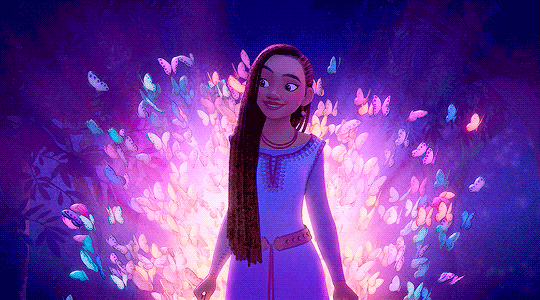
Evening, everyone! Tonight my mother and I went to go see Disney's most recent film, Wish, which fortunately came to theaters in my area right before its formal American release date. I'd been very curious to see how this tribute to Disney's last 100 years of filmmaking would turn out, and now that I've seen it...well, I have to be honest, I was a little disappointed. I want to be very clear both that I was going into this with a rather sunny outlook and that there are things I really liked in this film...but overall, it felt like a lot of the good ideas it had were only half-baked, and I found myself -- forgive me -- "wishing for something more" than what we got.
For a more comprehensive deep-dive...a cut!
The Good!
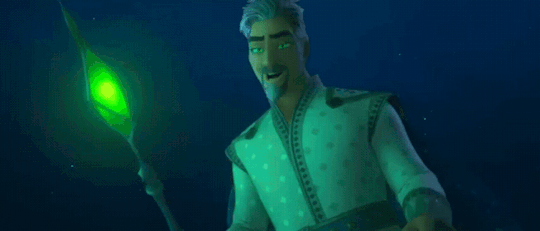
+The single best element in this film for me was Chris Pine's performance as our villain, Magnifico. There are definitely some things I can critique about Magnifico's overall storyline and "character arc" further down, but Chris was clearly having a grand old time being an egotistical, sassy jerkwad, and it totally showed. Even in his villain song This is The Thanks I Get?, which just screamed "passive-aggressive abusive parent," you can hear how much fun Chris was having in the studio, recording it. I just about always enjoyed when Magnifico was on screen, and I actually did really like the idea that a lot of his villainy is rooted in him being obsessed with control over everyone and everything. In a weird way, Magnifico's turn to the Dark Side parallels Anakin Skywalker's in the sense that he lost so much in the past that he's determined to never lose anything important to him again -- especially the power he's accrued to make himself feel strong, after having felt so powerless. I find that very interesting, and I kind of wish that aspect was really highlighted more in the story, but we'll talk about that later.
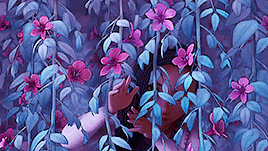
+Asha was a likable enough heroine, even if I found her to be a lot like a two-way fusion of Mulan and Anna placed in a vaguely Snow-White-ish role in her clearly Seven-Dwarf-inspired friend group. Ariana DeBose portrayed her rather well, both acting and singing-wise. I also liked the "social justice" bent to Asha's character where she wants better things not just for herself and her family, but also Rosas overall -- in the French translation of her main song "This Wish," they even push this further by having Asha wish "to see the world happy again someday." We haven't seen a heroine really express this kind of desire for a positive change in the world since Esmeralda in The Hunchback of Notre Dame, and that's cool! Plus representation in mainstream media for previously underrepresented groups is always nice. ^.^
+As much as I don't think they all got enough focus as individuals, I liked Asha's friend group! Especially the fact that it is a friend group made up of people that are around the same age as our protagonist, which -- let's be honest -- isn't that common for Disney heroines. Often with "sidekick groups," you're more likely to have situations like Cinderella with the mice (who are more like cutesy sidekicks than equals) or Snow White with the Dwarfs (who are all quite a bit older than our heroine)...so a friend group made up of peers with their own personalities and motivations was kind of fun.
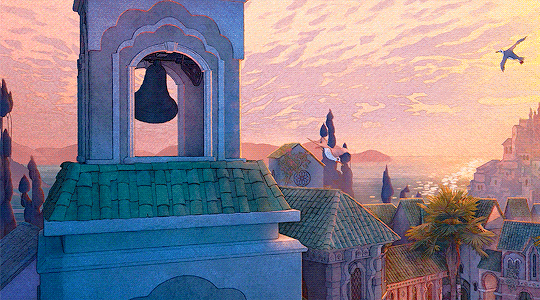
+The setting of Rosas itself could be pretty. I liked a lot of the Mediterranean-inspired architecture, especially inside Magnifico's tower.
+The combination of 3D and 2D-esque animation was also interesting! It really served to give the film its own distinctive visual style that sets it apart from other Disney projects, which I always appreciate.

+Star was...cute. Obviously just designed to sell plushies and definitely reminded me way too much of Kirby, but cute enough. I do think it's kind of cool that they're never gendered at all in the entire movie, because it'd be silly to think of a sweet little androgynous ball of stardust as being specifically male or female.
+I liked the idea of Simon "betraying" Asha, only to be turned into a pawn by Magnifico in the process, but not being treated unsympathetically by the story for it. Didn't love the full execution of the idea, but hey, that's what the negative section is for.
+The idea of everyone finding the power inside of themselves to stand up against Magnifico (because they're "all stars," and presumably all have the magic needed to make their wishes come true) was a little predictable, but still sweet. I have problems with how the film wrote it (which we'll get to), but the idea itself was wholesome and fitting.
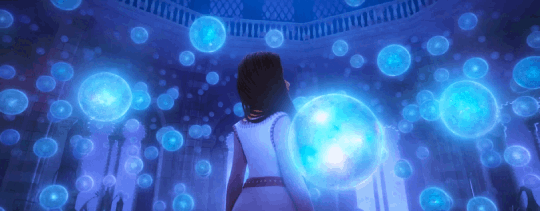
+I like several of the songs, just on their own -- I added This Wish and Knowing What I Know Now on my ITunes as soon as I first heard them prior to the film's release, and now I've added At All Costs too: it's a really pretty duet! (Gorgeous work, Chris and Ariana!) I'll leave my praise here, though, because sadly the soundtrack is going to get a lot of discussion in the less positive section.
The Not-So-Good...
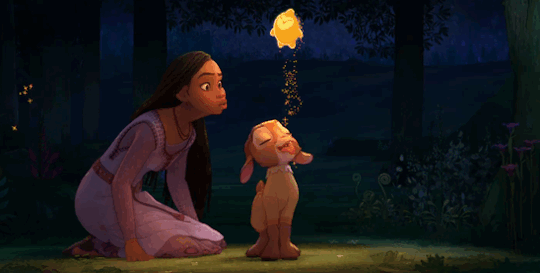
+This film being "Disney's 100th anniversary film" really got in the way of this movie telling a compelling and unique story sometimes. The whole movie really twisted itself into a pretzel trying to check off all the usual Disney tropes, and there were points that certain choices made the story seem incredibly stilted. For instance, one common Disney trope is a dead parent, so of course Asha has lost her father -- but we learn so little about him and he ends up playing such a small role in Asha's arc and story that it seems like an unnecessary detail. Asha's grandfather honestly plays more of a role in Asha's motivation throughout most of the film, so it would've made just as much sense to have Asha's grandfather be the one who believed in stars having power, rather than her father. Another example is the concept of the cute animal sidekick who's just there to make jokes -- as much as Valentino the goat didn't annoy me personally, he added just about nothing of value to the story whatsoever aside from comic relief, in contrast to other funny sidekicks like Sebastian from The Little Mermaid or Olaf from Frozen, who also serve a plot purpose and have a developed relationship with the protagonists. Then there's Asha being cut from the same "naive, awkward, wide-eyed idealist" cloth as many of our Disney Revival heroines like Anna, Rapunzel, and up to a certain point even Mirabel are; Star being in a similar vein to cutesy, innocent sidekicks like Pua, Crikee, and Baymax while Valentino is more akin to sassier, comic ones like Mushu and Sisu; her friends literally being based on the Seven Dwarfs from Snow White; our heroine getting a pretty standard "I Want" song and the villain getting his own solo number that doesn't really take any risks...oh yes, and we mustn't forget the trope of the Storybook opening, which (I'm sorry) I know was supposed to be a reference to Snow White, Cinderella, and Enchanted, but just gave me Shrek vibes the entire time. I was waiting for Shrek to rip out the page and use it for toilet paper any minute. It just felt a lot of the time like the movie was very paint-by-numbers, rather than throwing in much that was surprising or different.
+This isn't even touching all of the pointless meta references to other Disney movies. Asha wearing the Fairy Godmother's cloak and getting a wand like hers at the end -- the mushrooms crowing "we love crazy!" the way Hans did in Love is an Open Door -- Asha riding the reindeer the way Kristoff did in Frozen 2 -- Magnifico using green smoke hands a la Ursula -- the ending with those obvious Wendy and Peter Pan look-alikes, come on, really??? That was just painful.
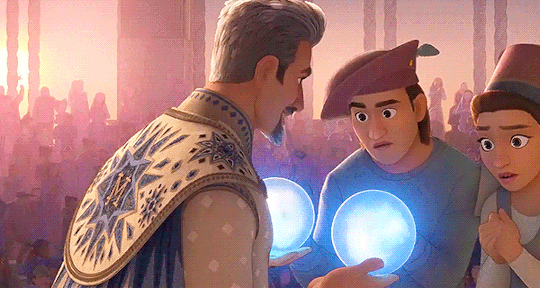
+As much as Magnifico was an awesome idea for a character and Chris Pine's performance was beyond entertaining, the movie did not always write him as well as they could've. From the very start, we see this guy is an egotistical control freak -- obsessed with his own image, incredibly hard-to-please, arrogant, vain, desperate for attention and unwavering praise and adoration from all of his subjects, and determined to keep an iron grip on everyone else's wishes because of the power it gives him. He's ALREADY a terrible person, from the start -- and yet the film tries to introduce this dark magic book that gets no explanation or backstory whatsoever and has no real characterization or presence, so it leaves no real impact on the audience corrupting him and making him a bad person, when it didn't need to! Magnifico was already the villain this film needed! Just let him fall head-first into madness without the book prompting anything! Even if Magnifico "lost everything" in the past, that doesn't make him a good person, if he takes everyone's wishes away from them and hoards them all to himself, only to grant a few now and again when it would make him look good.
+This above point actually leads nicely into one change I really, really wish the film had been ballsy enough to make -- have Asha already be Magnifico's apprentice, not trying to become it at the start of the story. Give our villain and hero a real relationship, with history that started before the events of this film! Asha lost her father at the age of 12...how interesting would it have been -- whether to make Magnifico more of an anti-villain or show how manipulative he really is -- if he'd tried to fill that fatherly role for our main character and twist her to serve his ends? What if At All Costs was rewritten to be about Magnifico not just being determined to hold onto all of the kingdom's wishes, but also this apprentice he sees as an extension of him and his legacy, while Asha is determined to protect this Star she's accidentally summoned and the suppressed wish of hers it represents? This change would've made Asha's break with Magnifico so much more powerful for both of them -- it would've both justified Magnifico's descent into madness and given Asha more reason to feel like it was her responsibility to stop Magnifico. You even could've then played more with Asha's relationship with Queen Amaya too, in this kind of a scenario.
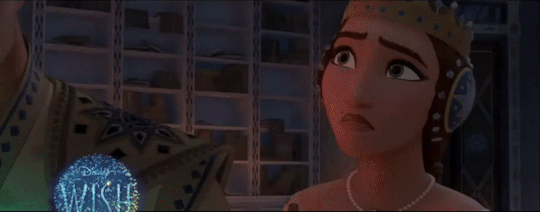
+Oh yeah, and on that note, Queen Amaya. OOH, this really annoyed me -- okay. So this woman is supposed to be a good guy, in this story. But as I touched on earlier, Magnifico was already a pretty awful person, hoarding people's wishes away in order to make himself powerful. Was Amaya truly so blind to that? Did she truly never question anything, ever? But no, really, she only turns on Magnifico after he starts using the dark magic book and actively threatens her. Only that makes her turn from him, and it's pretty damn immediate. Now okay, I hear you saying, it's like Amaya sings in Knowing What I Know Now, right? "The good in him, I've watched it melt // I was blinded by the love I felt"? Excuse me, lady -- but Magnifico wasn't a good person, before. He was just playing a part so as to stay powerful and adored by the masses. And if the story wants to claim otherwise, and act like that dark magic book was responsible for Magnifico going bad, then why would our Queen decide to keep him locked up in his staff's crystal forever? If the book was responsible, then Magnifico would be the Frodo or Golum to the book's One Ring -- he'd be a victim, in such a scenario: one in need of help and pity, not punishment. So either Amaya is a selfish person who only cared about her husband's mistreatment of others when it affected her, or she's a needlessly cruel person who decides to punish her husband for a vice that anyone could fall prey to. Either way, I don't want this woman ruling anyone! Make this woman a straight-up villain, same as her husband, and have the whole monarchy come crashing down after she and Magnifico both go down in flames! VIVE LA RESISTANCE! (Playing into my idea with Asha being Magnifico's apprentice all along, maybe there could even be a twist on the Evil Stepmother trope with Amaya, where she's jealous of how much Magnifico has tried to groom Asha as his apprentice, rather than spending time and/or starting a family with her or something.)
+As I touched on earlier, there wasn't even close to enough time to develop all of these characters properly. Since our heroine and friends are most similar to Snow White and her friends the Seven Dwarfs, let's compare cast size. Snow White is 83 minutes long and has a cast of ten (Snow, the Prince, the Queen, and the Dwarfs) -- Wish is 95 minutes long and has a cast of fourteen (Asha, Magnifico, Star, Valentino, Amaya, Asha's mum and grandpa, and our seven Friends). This results in us getting the vague idea that "Grumpy" role Gabo is sweet on our "Bashful" role Bazeema, but no time to develop their relationship or give it any kind of conclusion; the others saying "Sneezy" role Safi apparently loves the castle chickens with no sympathetic explanation why, to the point that he gets super excited about a chicken growing to a giant size for no real reason; "Doc" role Dahlia having a crush on Magnifico that is then dropped immediately after Asha turns against him; oldest kid and "Sleepy" role Simon feeling incomplete without the dream he gave Magnifico and "betraying" Asha as a result in an attempt to get it back, only to get stabbed in the back by Magnifico, and then have no time for a proper redemption after he's unhypnotized; Asha's grandfather turning on a dime about whether or not he wants to know what his wish was if Magnifico thought it was dangerous; Magnifico getting some justification in his backstory for his bad behavior, but Amaya's backstory being a complete black hole before she married Magnifico when you'd think it'd explain all the more why she stuck with him so long; and Asha's mum having her wish crushed to dust by Magnifico and then given back without us EVER LEARNING WHAT IT EVEN WAS IN THE FIRST PLACE, even after we see just about everyone else's wishes as soon as somebody picks it up and Asha's mum's wish gets picked up multiple times!! Come on, if you're going to set up NOT showing it, you may as well have a pay-off for it!! At least give us some moment where Asha's mum hugs her in relief and acknowledges that her daughter was her wish! That would've been a nice "aww" moment for everyone!
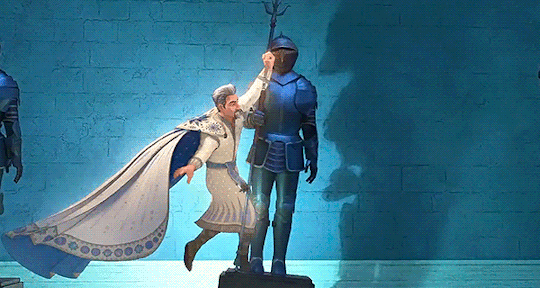
+Okay, I said I was going to talk about my problem with the songs, so here goes. As I said before, I listened to the soundtrack before watching the movie, and even when I did, I could immediately sense a problem: these songs did not tell me much of anything about the movie, just on their own. Welcome to Rosas, which is pretty much just an exposition dump about the kingdom and how Magnifico founded it, didn't really paint a picture of our setting or characters much at all, the way opening songs like Belle or The Family Madrigal do. This Wish, although pretty, was something I could hear just as easily on the radio -- it didn't feel as tied or necessary to understanding our heroine the way something like Part of That World does. I'm a Star, quite frankly, felt like a lot of inspirational word salad, rather than anything particularly memorable or revelatory -- why else wouldn't it even be worthy of a musical salute in the reprise, where Asha remembers that she and everyone else are stars during the climax? Even after reading summaries of the plot and spoilers from the storybook for this film, I could not figure out for the life of me how At All Costs would fit organically into such a story, being sung by our villain and hero. It wasn't until I saw the film that I saw how the filmmakers decided to fit it in and honestly...the song didn't help tell that particular scene at all. It's a really pretty song and I like it a lot -- but it lacked any of the irony or contrast that kind of a scene that introduces the difference in focus between our hero and villain required. If the scene itself is needed to understand what's supposed to be going on while the song is playing, then the song is not effectively telling the story and is therefore unnecessary. There wasn't even a particularly Spanish or Mediterranean flair to the soundtrack to help set the stage, aside from the occasional flourish of castanets -- instead it sounded very contemporary, which I guess is appropriate, since it was largely written by pop composers rather than any musical theater talent.
+There were also points where the songs felt the urge to shove in a bunch of extra words just because, rather than have the words flow well and really mean something. I'm a Star is most guilty of this, of course, but even in This is the Thanks I Get?, we hear Magnifico gripe that "I let you live here for free and I don't even charge you rent" -- mate, THAT MEANS THE SAME THING! If you live somewhere for free, then you are NOT paying rent!
+Knowing What I Know Now is a bop and I like it (aside from Amaya's stupidity), but I'm sorry, all I can think when I hear it is "This is clearly trying to be Ready as I'll Ever Be from Tangled the Animated Series, but that song blows this out of the water." However fun the song can be, it would've been so much stronger if it actually addressed the contrast between the characters and revved us up for a big final battle, instead of it just being our eight underdeveloped characters psyching each other up.
+The idea of everyone being stars was a lovely idea, but the execution of Asha remembering this fact and using it to defeat Magnifico was terribly handled. First off, there was no revelatory phrase or action that prompted Asha to remember this fact, so her suddenly saying that "they're all stars" came out of nowhere. Second, even putting aside that there'd be no way any of her friends could hear Asha from all the way up on the tower if they're stuck in the courtyard below, there's no reason I can see for Asha's friends or family to know what the hell she was even TALKING about. They weren't there when the I'm a Star number happened! And the way that number made it seem, just based on the visuals, it looked like the "star" power came from a person's dream, since it's the same glow that returns to Asha's grandfather when he gets his dream back, but most of the town's dreams have been already yanked out by Magnifico at this point! I think the idea is that since everyone is a star, even with that big piece of them and the power accompanying it taken out, they still have enough stardust inside of them to be powerful enough to chase their heart's desires...but yeah, I'm sorry, for all the word salad I'm a Star threw around, this world-building aspect was really not made clear, and because of that and the lack of a proper callback to this plot turn, the climax didn't hit as strong as it should've.
Overall, this film felt a lot like a batch of unbaked chocolate chip cookies that someone decided to throw a bunch of brightly colored sprinkles on top of, just because they could. A lot of ideas just don't feel like they were fully developed, and there was a lot tossed in that didn't contribute to the overall taste or bring the disparate elements together in a cohesive whole, instead feeling more like a distraction than anything of actual substance. That doesn't mean I couldn't eat it -- I like eating cookie dough as much as the next person -- but that doesn't mean it felt like a complete, finished product worthy of great praise. Instead I'm left looking at the wasted potential and wishing the movie had carved out its own path more, one distinctive to itself, rather than just be a mashup of previous Disney concepts and tropes. I won't act like there's nothing to like here, nor that it's completely lacking in heart: I actually would love to see fandom for this movie re-imagine it in ways that could've improved the story and characters, because there were SO many good ideas here...but for me personally, this movie left me colder than it should've and -- like Asha after meeting Magnifico -- a bit disappointed.
So I make this wish...to have Disney make a film better than this.
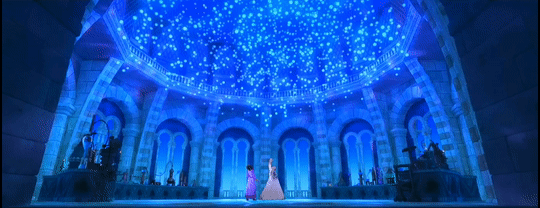
Overall Grade: C-
77 notes
·
View notes
Text
Dylan O’Brien Sets ‘Twinless’ With James Sweeney Directing & Starring; Republic Pictures Takes Global On Three Point Capital & David Permut Production
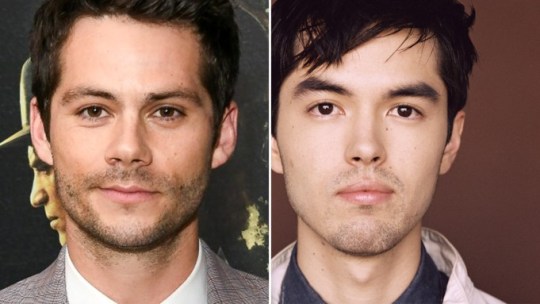
EXCLUSIVE: Dylan O’Brien is set to headline in James Sweeney‘s dark comedy Twinless, which the latter wrote and will also star in. Republic Pictures has taken global rights to the movie. Cameras are currently rolling on the movie in Portland, OR. O’Brien will executive produce.
The pic follows two young men who meet in a twin bereavement support group. An unlikely bromance develops between them. Twinless follow Sweeney’s directorial debut, Straight Up, which notched the filmmaker a Best First Screenplay nom at the 2021 Independent Spirit Awards.
Three Point Capital is financing the film with Ali Jazayeri, David Gendron and Liz Destro also serving as EPs.
Twinless is produced by Academy Award nominated producer David Permut and Permut Presentations (Hacksaw Ridge, Face/Off) whose most recent Netflix movie, Rustin, garnered Colman Domingo a Best Actor Oscar nomination.
Miky Lee (Parasite) Vice Chairwoman of CJ and who most recently executive produced the Oscar nominated film Past Lives, serves as EP.
Permut Presentations Director Of Development Alex Astrachan co-produces.
Permut said, “I was absolutely knocked out by James’ first film Straight Up and was determined to work with him. I immediately responded to the originality and provocative concept of Twinless. The dark comedy depicts complex characters in such an irreverent, emotional and hysterical way. The chemistry between Dylan, who portrays the role of identical twin brothers, opposite James’ character is absolutely combustible.”
O’Brien’s most recent film is the independent feature Ponyboi, in which he plays a villainous pimp and small-time drug dealer, recently premiered at the Sundance Film Festival. He will next be seen in the upcoming films SNL 1975 (from director Jason Reitman) as Dan Aykroyd, Caddo Lake (from the writing-directing team of Logan George and Celine Held, and producer M. Night Shyamalan), and Anniversary (a thriller co-starring Diane Lane, Kyle Chandler, Zoey Deutch and Phoebe Dynevor). The $1.7 billion grossing star is well-known to audiences from his work in The Maze Runner franchise, as well as the hit MTV series Teen Wolf.
Permut also recently produced the Paramount+ series hit, Lawman: Bass Reeves from Taylor Sheridan, which stars SAG nominee David Oyelowo. His upcoming high priority slate includes Being Heumann written and directed by Academy Award winner Sian Heder (CODA) at Apple, Jonathan Dayton and Valerie Faris’ (Little Miss Sunshine) film The Invite, and Face/Off II at Paramount, the sequel to Permut’s 1997 hit film, to be directed by Adam Wingard.
Sweeney is repped by UTA, 2AM and Brecheen Feldman Breimer Silver and Thompson. O’Brien is repped by WME, Principal Entertainment, and Lichter, Grossman, Nichols, Feldman, Rogal, Shikora & Clark and Permut is repped by John Tishbi at Pearlman & Tishbi.
Three Point Capital, established in 2009, is a financier and service provider in the film, television, and commercial industries. They have financed over 400 films, including The Butler, Clerks III and the Oscar-winning Manchester by the Sea. They most recently provided funding for the upcoming Michael Keaton starrers Know Goes Away and Goodrich, the Nicholas Cage starrer Longlegs, the Tina Fey/Jon Hamm comedy Maggie Moore(s) and the recent Sundance premiere Rob Peace.
Paramount Global Content Distribution is revitalizing the former Republic Pictures label, originally founded in 1935. The newly branded acquisition label will leverage Paramount Global’s vast worldwide distribution channels, across home entertainment and third-party distribution platforms to distribute a wide range of acquired films. Republic Pictures is an acquisition-only label under Paramount Pictures.
Source: deadline.com
52 notes
·
View notes
Text

Arthur Asher Miller (October 17, 1915 – February 10, 2005) was an American playwright, essayist and screenwriter in the 20th-century American theater. Among his most popular plays are All My Sons (1947), Death of a Salesman (1949), The Crucible (1953), and A View from the Bridge (1955). He wrote several screenplays, including The Misfits (1961). The drama Death of a Salesman is considered one of the best American plays of the 20th century.
Miller was often in the public eye, particularly during the late 1940s, 1950s and early 1960s. During this time, he received a Pulitzer Prize for Drama, testified before the House Un-American Activities Committee, and married Marilyn Monroe. In 1980, he received the St. Louis Literary Award from the Saint Louis University Library Associates. He received the Praemium Imperiale prize in 2001, the Prince of Asturias Award in 2002, and the Jerusalem Prize in 2003, and the Dorothy and Lillian Gish Prize in 1999.
Miller's writing career spanned over seven decades, and at the time of his death, he was considered one of the 20th century's greatest dramatists. After his death, many respected actors, directors, and producers paid tribute to him, some calling him the last great practitioner of the American stage, and Broadway theatres darkened their lights in a show of respect. Miller's alma mater, the University of Michigan, opened the Arthur Miller Theatre in March 2007. Per his express wish, it is the only theater in the world that bears his name.
Miller's letters, notes, drafts and other papers are housed at the Harry Ransom Humanities Research Center at the University of Texas at Austin. Miller is also a member of the American Theater Hall of Fame. He was inducted in 1979. In 1993, he received the Four Freedoms Award for Freedom of Speech. In 2017, his daughter, Rebecca Miller, a writer and filmmaker, completed a documentary about her father's life, Arthur Miller: Writer. Minor planet 3769 Arthurmiller is named after him. In the 2022 Netflix film Blonde, Miller was portrayed by Adrien Brody.
Miller donated thirteen boxes of his earliest manuscripts to the Harry Ransom Center at the University of Texas at Austin in 1961 and 1962. This collection included the original handwritten notebooks and early typed drafts for Death of a Salesman, The Crucible, All My Sons, and other works. In January, 2018, the Ransom Center announced the acquisition of the remainder of the Miller archive, totaling over 200 boxes. The full archive opened in November, 2019.
Christopher Bigsby wrote Arthur Miller: The Definitive Biography based on boxes of papers Miller made available to him before his death in 2005. The book was published in November 2008, and is reported to reveal unpublished works in which Miller "bitterly attack[ed] the injustices of American racism long before it was taken up by the civil rights movement". In his book Trinity of Passion, author Alan M. Wald conjectures that Miller was "a member of a writer's unit of the Communist Party around 1946", using the pseudonym Matt Wayne, and editing a drama column in the magazine The New Masses.
In 1999, the writer Christopher Hitchens attacked Miller for comparing the Monica Lewinsky investigation to the Salem witch hunt. Miller had asserted a parallel between the examination of physical evidence on Lewinsky's dress and the examinations of women's bodies for signs of the "Devil's Marks" in Salem. Hitchens scathingly disputed the parallel. In his memoir, Hitch-22, Hitchens bitterly noted that Miller, despite his prominence as a left-wing intellectual, had failed to support author Salman Rushdie during the Iranian fatwa involving The Satanic Verses.
Works
Stage plays
No Villain (1936)
They Too Arise (1937, based on No Villain)
Honors at Dawn (1938, based on They Too Arise)
The Grass Still Grows (1938, based on They Too Arise)
The Great Disobedience (1938)
Listen My Children (1939, with Norman Rosten)
The Golden Years (1940)
The Half-Bridge (1943)
The Man Who Had All the Luck (1944)
All My Sons (1947)
Death of a Salesman (1949)
An Enemy of the People (1950, adaptation of Henrik Ibsen's play An Enemy of the People)
The Crucible (1953)
A View from the Bridge (1955)
A Memory of Two Mondays (1955)
After the Fall (1964)
Incident at Vichy (1964)
The Price (1968)
The Reason Why (1970)
Fame (one-act, 1970; revised for television 1978)
The Creation of the World and Other Business (1972)
Up from Paradise (1974)
The Archbishop's Ceiling (1977)
The American Clock (1980)
Playing for Time (television play, 1980)
Elegy for a Lady (short play, 1982, first part of Two Way Mirror)
Some Kind of Love Story (short play, 1982, second part of Two Way Mirror)
I Think About You a Great Deal (1986)
Playing for Time (stage version, 1985)
I Can't Remember Anything (1987, collected in Danger: Memory!)
Clara (1987, collected in Danger: Memory!)
The Ride Down Mt. Morgan (1991)
The Last Yankee (1993)
Broken Glass (1994)
Mr. Peters' Connections (1998)
Resurrection Blues (2002)
Finishing the Picture (2004)
Radio plays
The Pussycat and the Expert Plumber Who Was a Man (1940)
Joel Chandler Harris (1941)
The Battle of the Ovens (1942)
Thunder from the Mountains (1942)
I Was Married in Bataan (1942)
That They May Win (1943)
Listen for the Sound of Wings (1943)
Bernardine (1944)
I Love You (1944)
Grandpa and the Statue (1944)
The Philippines Never Surrendered (1944)
The Guardsman (1944, based on Ferenc Molnár's play)
The Story of Gus (1947)
Screenplays
The Hook (1947)
All My Sons (1948)
Let's Make Love (1960)
The Misfits (1961)
Death of a Salesman (1985)
Everybody Wins (1990)
The Crucible (1996)
Assorted fiction
Focus (novel, 1945)
"The Misfits" (short story, published in Esquire, October 1957)
I Don't Need You Anymore (short stories, 1967)
"Homely Girl: A Life" (short story, 1992, published in UK as "Plain Girl: A Life" 1995)
Presence: Stories (2007) (short stories include "The Bare Manuscript", "Beavers", "The Performance", and "Bulldog")
Non-fiction
Situation Normal (1944) is based on his experiences researching the war correspondence of Ernie Pyle.
In Russia (1969), the first of three books created with his photographer wife Inge Morath, offers Miller's impressions of Russia and Russian society.
In the Country (1977), with photographs by Morath and text by Miller, provides insight into how Miller spent his time in Roxbury, Connecticut, and profiles of his various neighbors.
Chinese Encounters (1979) is a travel journal with photographs by Morath. It depicts the Chinese society in the state of flux which followed the end of the Cultural Revolution. Miller discusses the hardships of many writers, professors, and artists during Mao Zedong's regime.
Salesman in Beijing (1984) details Miller's experiences with the 1983 Beijing People's Theatre production of Death of a Salesman. He describes directing a Chinese cast in an American play.
Timebends: A Life, Methuen London (1987). Miller's autobiography.
On Politics and the Art of Acting, Viking 2001 an 85-page essay about the thespian skills in American politics, comparing FDR, JFK, Reagan, Clinton.
Collections
Abbotson, Susan C. W. (ed.), Arthur Miller: Collected Essays, Penguin 2016
Kushner, Tony, ed. Arthur Miller, Collected Plays 1944–1961 (Library of America, 2006).
Martin, Robert A. (ed.), "The theater essays of Arthur Miller", foreword by Arthur Miller. NY: Viking Press, 1978
Daily inspiration. Discover more photos at Just for Books…?
6 notes
·
View notes
Text

New-to-me (horror) movies seen in 2023: Incident at Loch Ness (2004)
@goryhorroor ’s challenge: Underseen found footage
If you're a fan of Werner Herzog's documentaries, you have to see this. I mean it.
Incident at Loch Ness is a movie in a movie in a movie, a found footage film about a documentary about a documentary. Werner Herzog is out to examine "the difference between fact and truth" with a movie about the Loch Ness Monster legend, intended to be more about the culture around it than any monster itself. He is portrayed as eccentric and condescending, but at least he's trying to make a real documentary. Producer Zak Penn (also playing himself) wants a real Loch Ness Monster movie, and he's prepared to hire actors and stage a hoax to get one. And as these two men carry out their ideological fight over filmmaking, they circle closer to a creature in the water who is both hungry and territorial...
While primarily a comedy- I practically fell over laughing at several points- watching National Geographic turn into Moby Dick keeps the tension high, just as the villain would have wanted. I've often said that found footage filmmakers should study actual scary documentaries, including Herzog's Grizzly Man, to get a feel for both the kind of shots that would be taken and the personalities that would make these kinds of films. When Herzog picks up a camera at a point when it looks like he may be about to die, he says it was pure instinct. Even if I'd never seen one of his films before, I would believe him.
I keep pressing this film as funny for Herzog fans- there's one sequence parodying the rumor that he directed Klaus Kinski at gunpoint, among other in-jokes- I don't think you need to have seen any of his films to get the point. There have been enough exposes about falsified or heavily slanted documentaries that the increasingly bad conditions and setup pushed by the producer feels unfortunately plausible. Heck, it even made me look back on Herzog's real films critically. He probably doesn't actually look for interview subjects whom he calls kooks, or else he wouldn't have joked about it here- but if he does, how would I know?
Maybe Nessie is just a big fan of truth in film.
46 notes
·
View notes
Text
'There is a moment in NT Live’s Vanya – a one-man version of Anton Chekhov’s 1898 classic Uncle Vanya – where it feels fully possible that Andrew Scott could have cloned himself, and that three versions of him are on stage at once. He’s chameleonic enough that you’d believe it.
Vanya shows how life on a rural estate is completely upended when famous filmmaker Alexander, and his young, glamorous second wife Helena, visit. During this time, estate manager Ivan (Vanya) and country doctor Michael both fall for Helena, and consequently reevaluate their lives. The play stars Andrew Scott portraying all seven characters – including Ivan’s niece Sonya, housekeeper Maureen and local boy Liam – in a powerhouse, multipronged performance. The production enjoyed a sell-out run on the West End last year, alongside a spate of five-star reviews.
In a way, it feels like Scott’s career has been building towards Vanya, so varied are his most celebrated roles. Starting out on the stages of his native Ireland, the West End and Broadway, Scott burst onto our television screens in 2010 as the delightfully unhinged villain Jim Moriarty in BBC’s Sherlock. He gave a playful, terrifying edge to a character who is usually dull and professorial in his ruthlessness. Since then, Scott has been a mainstay of stage and screen, his characters running the gamut from Hamlet to Bond antagonist (Spectre), fantasy hero (His Dark Materials) to droll matinée idol (Present Laughter), the latter of which earned him an Olivier. With every part, Scott conveys a sense of something deeper going on under the surface – unsaid, but clearly legible on his face.
With his beloved ‘Hot Priest’, hired to officiate a family wedding in series two of Fleabag (2019), Scott further demonstrated this facility for internal performances. His clergyman forms a tentative, transgressive romantic relationship with Phoebe Waller-Bridge’s titular tearaway, which simultaneously heals and serves as rock bottom for both of them. Scott brings a quiet confidence to the priest as he flirts with abandoning his vows, trying to do the right thing no matter how much it hurts. It’s terrifically subtle, deeply felt work.
Scott is uniquely adept at holding space for emotion, as seen with Adam, a man dealing with the impact of a lifetime of loneliness in Andrew Haigh’s All of Us Strangers. He brings a guardedness to the character, who discovers that his late parents are alive and waiting for him in the house he grew up in. His visits home become the key to opening himself up to a romantic relationship with his neighbour (Paul Mescal). Throughout the film, we feel Adam’s gratitude and grief as he discovers the love and support he’s denied himself for so long. Scott is a master of smiles that never quite make it to the eyes, of lit-up eyes downplayed with hesitant smiles. His emotions are fluid, never vacillating, never overwrought.
He takes his considerable skills to new heights in Vanya, where he showcases his immense versatility as an actor. One minute, he’s a beleaguered and gossipy housekeeper, and the next – literally, the very next – he’s a bored and depressed doctor. Another moment, and he’s a young woman filled with hope and energy, and, almost in the same breath, he’s transformed into her uncle, whose decline from cringey jokester to an utterly lost man has happened before our eyes.
Scott introduces us to each of his characters slowly: establishing their physicality, their voices, their mannerisms. His transitions between them are more marked at the beginning, when he uses props and leaves space for us to register his change in posture, or physically moves from one side of the room to another. He accustoms us to the characters’ different voices – Helena’s is cold, reserved and posh; Alexander’s slow and scatterbrained; Ivan’s jovial and tense, like something could imminently break. Some characters are linked with certain props: Sonya with her tea towel, Michael with his tennis ball, Ivan, again, with his comedy sound-effects box.
But eventually these visual clues fall away, and we know everyone by their sound and posture. Soon, Scott is setting one character down and picking another up as he rises. He is both the person being blocked and the one doing the blocking, the person being comforted and the one tenderly stroking their head. Even the scenes of sexual intimacy between two characters are made believable, handled in a way so focused and naturalistic they don’t seem contrived or actorly. By the play’s end, Scott is throwing his voice as one character and reacting as another, and we know who is who by the arc of his brow, the curve of his smile or the movement of his hand.
These smaller movements, which would be felt more than seen from anywhere other than the front rows of a theatre, are what give this cinematic version of Vanya its magic. It’s in the way Sonya can handle a tea towel both nervously and with resolve, the way Michael’s slumped posture goes from listless to lustful and the way Ivan slowly crumbles, sloughing off layer upon layer of coping mechanisms. All of the decisions Scott makes as an actor are clearly rooted in a deep empathy for each of these characters. Quite a feat, then, to maintain this dedication for more characters than can be counted on one hand over the course of two hours.
Vanya is an acting masterclass, a beautiful unfurling of Scott’s multifacetedness. It’s a culmination of what we love about him as an actor: his constant, daring shapeshifting. If he was at the top of his game before, then now he is absolutely stratospheric.'
#Andrew Scott#Vanya#All of Us Strangers#Anton Chekhov#Jim Moriarty#Sherlock#Hot Priest#Fleabag#Hamlet#Spectre#His Dark Materials#Present Laughter#Olivier Award#Phoebe Waller-Bridge#Paul Mescal#Andrew Haigh#NT Live
8 notes
·
View notes
Text

Niall MacGinnis as Menelaus in the 1956 film "Helen of Troy."
A constant problem with the multiple screen adaptations that side with the Trojans and villainize the Achaeans, is that it is rarely there are more fantastic performances on the Trojan side than on the Achaean side. As a result, while the filmmakers want you to root for the Trojans, it is more often that not the Achaeans you end up rooting for and this film is no exception.
Niall MacGinnis was a phenomenal actor in his day, bringing a performance only he could do, while with Jacques Sernas as Paris, you find yourself asking: "Besides the will of the writers, why is Helen going with that block of wood again?" Jacques Sernas' performance was one anyone could have done.
Despite being intended as the villain, with the Achaean king being portrayed as pirates who want to loot Troy, Menelaus is far more sympathetic, being more stern than truly brutish and the realization that Helen is gone leaves him truly hurt.
Also, as a funny piece of coincidence, Niall MacGinnis was an Irish actor who had been born in Dublin and was in his forties when he played Menelaus. So was Brendan Gleeson.
5 notes
·
View notes
Note
Circling back to Wuthering Heights - descriptions of Heathcliff in the book often emphasize his dark skin and hair, including by comparing him to multiple non-white populations (on Heathcliff's wikipedia page, the first paragraph under the Character section provides a few quotes which demonstrate this), but the anon is also correct that he has been portrayed by white actors a lot over the years, and I imagine many people's perception of the character is informed by those adaptations, perhaps leading later adaptations to continue the trend. One could potentially make a case that he's just a super tan and dark-haired white guy (in a racist-characters-describe-anyone-less-pale-than-themselves-as-looking-like-poc way), but given that so few adaptations cast an actor of color in the role, one could also argue it's a missed opportunity to just cast a white actor again, especially since it's very easy to argue that he was intentionally written as a character of color. Obviously racism is a factor in such adaptational choices, but I do also wonder if some filmmakers might feel a bit uncomfortable making Heathcliff non-white in their adaptations because the angry and abusive aspect of the character and his obsessive relationship with Cathy (which already make a lot of people uncomfortable on their own) could lead to accusations of playing into racist stereotypes of hotheadedness and fixation on a white woman, depending on the audience's previous knowledge of the character and/or how deftly the film handles things. It's a hard book to adapt, I guess is what I'm saying? Anyway, sorry for the ramble, just thought I'd add on a little. It will be interesting to see how everything plays out with the upcoming version
no i appreciate the ramble and your thoughts. i do agree it would play into stereotypes if a poc played him, but i still think it’s a missed opportunity. a case could be made that the obtuse comparison of fiction with real people just to prove a prejudice they have and feel validated in their notions disables poc from getting certain opportunities. because by this logic, poc could never play a complex villain/anti-hero. ofc what you’ve said still rings true and it’s not possible to stop people from holding onto their perceptions, but im just making a point. anyway, none of this is to say that im outrageously mad; we’re just having a conversation and im happy for jacob for getting that role (also, he worked with emerald on saltburn and pretty sure she just thought that he would be able to embody heathcliff’s character)
4 notes
·
View notes
Text
Villain Breakdown: Thanos, the Mad Titan
It's finally here. After ten years of waiting, Thanos at last made his big screen debut. And. It's. Complicated.
Thanos is one of the most divisive villains that the MCU has. It feels like there is a world of difference between the character that the filmmakers think they made and the character that audiences saw.
The filmmakers believe they've crafted a deep and compelling character here. Thanos, throughout the movie, is presented like the progressive villain. Someone who has identified a real and serious problem with society, but whose personal failings have caused him to misidentify the solution.
Thanos as written is cruel, ego-driven, and obsessed with proving his own rightness even when everyone around him is telling him to stop. He's a wicked foil to Tony operating on a far grander scale. And even though the problems he seeks to solve are real, he must be stopped nonetheless because his preferred solution is monstrous.
He's more or less written like Killmonger. "You were all wrong to turn your backs on the rest of the world," yes. But also "You have become just like the people you hate so much." The problem needs to be solved. But not by him and not like this.
The problem with Thanos is that he's wrong. Not that his solution is wrong, but that his solution could have never been right in the first place, because the problem he thinks he's identified is a long-discredited theory of economics written before industrialization largely eliminated the problems of scarcity. He's not "right, but in horrifying ways". He's just wrong.
Thanos does not have the slightest idea what he's talking about. This makes the scenes where he rants unchallenged about his economic beliefs infuriating rather than dramatic. He's a moron who kills planets because he doesn't understand how economics work, who abuses his "children" and murders his "daughter" and calls it love when he does so.
He was written as a deep and complex character. He's portrayed as a deep and complex character. The camera dwells on him making sad faces and pained expressions. The story speaks at length about the painful sacrifices he has to make, while he waxes poetic about the only man strong enough to make them. Hard Man Makes Hard Choices.
But he's just a monster. An uncomplicated shitweasel given an undeserved amount of pathos by the story. And it's to the film's detriment that this uncomplicated shitweasel is basically its main character. Infinity War screwed up with Thanos and the rest of the film pays for it.
But at least he gets to have cool fights. That's something, I suppose.
12 notes
·
View notes
Text
OKAY i just finished the 2000s Jesus Christ Superstar movie and I really enjoyed it as well. At the start I was under the impression that this was meant to be like, an actual movie adaptation and not 'just' a filmed version of the stage musical but when the last supper scene started I realized that theyve been on the same set the whole time and the only other set theyve shown was that small room where they sang This Jesus Must Die, so this was probably meant to be a fairly straight forward recording of the stage show only with some more elaborate and cinematic camera work. And I made that whole post complaining about the more theatrical staging of the 2000s film and why it didnt work and then I realized its because I really misjudged the filmmakers intentions and I was able to enjoy the movie way more after that.
Id say both movies are equally good, they just have different strengths. Like, if you prefer something thats grittier and closer to reality and is filmed more like a traditional movie, Id recommend the 70s film but if you prefer something more colorful and theatrical and presumably more accurate to the stage show, Id recommend the 2000s film.
Personally, I think im leaning more towards the 70s movie because while theres so much to like about the 2000s one, I just cant get past the actors they got for Jesus and Judas. I already didnt like Jesus in the original movie so the only thing that really changes here are my reasons for disliking him. I think in one of my previous posts I said that 70s movie Jesus brought the Jesus Christ while 2000s movie Jesus brought the Superstar and I prefer Jesus Christ and. yeah, cant sum it up any better than that
What they did with Judas was just awful though. The second the actor came on screen I was like "ohhhhhh noooooooo I dont think Im gonna like this guy" and yeah, I didnt. But unlike with Jesus where he really wasnt written or framed different and it mostly came down to the performance, i feel like they really went out of their way to portray him as way more malicious and antagonistic and it was just bad man. Like, when Mary is done putting Jesus to bed and singing her song about how He Scares Her So they reintroduce him like some kinda horror movie villain and like we're meant to be jumpscared by him its so weird. And then during that last song hes not wearing white and singing exclusively with presumed angels, hes wearing red and black like he did before the betrayal and hes singing with all these women who are also dressed in red and black but theres also this choir of angels in the background and its just messy and confusing. Like, I was kinda confused by that scene in the original movie but thats because the location suddenly changed, the actual point of it was pretty clear to me; Judas and his backup singers are audience inserts who are trying to make sense of Jesus and the things he did. In the 2000s movie there are two groups, the angels and Judas' guys and the latter appear needlessly antagonistic towards Jesus for no real reason because of the framing and because of the way Judas has been characterized. It feels like theyre taunting him, its so weird and I really dont like it. Also, while the actors singing voice was alright for most of the film (I didnt like his delivery but he wasnt an awful singer or anything) during the song right before he dies his voice just sounds so rough and raspy and awful, I really hate actors in a musical movie are like "oh Im letting the acting take precedent over the singing, oh im applying the reality of the situation I cant sing this pretty" because thats not the point of musicals!! stop it!!!
The other big issue I had was that there were no breaks between musical numbers whatsoever so Id often get whiplash because there was practically no breathing room between songs. Like, JCS is entirely sung-through with no real spoken dialogue but you gotta have a few breaks in there man (also they had those breaks in the 70s movie and it was a lot better that way)
But thats enough complaining, lets get to the shit I liked!! Right off the bat, I liked Judad kissing Jesus because the way it was filmed and acted made it look like Judas just went in for a straight up makeout session and I love that. Judas/Jesus shippers stay winning!
I also adored the lighting and and the camerawork, there were so many striking still images and they made great use of contrasting colors and dark silhouettes like during the crucifiction and when Mary was telling jesus to rest and the set was bathed in this cool shade of dark blue while they were both this warm orange and when they were singing This Jesus Must Die in that black room with the cool lighting and then the screens on the walls suddenly turned on and brought in these warm orange undertones
Speaking of This Jesus Must Die, I loved the way they handled that scene and the Hosanna, Heysanna scene right afterwards, its probably one of my favorite sequences in the movie
The scene ends with a bunch of guys in like riot police gear coming out and trying to arrest everyone/beat everyone to death and then right after that we get the bit where theyre all like Did You See I Waved I Believe In You And God So Tell Me That Im Saved and theyre passing around guns and stuff and I have no strong feelings about that, I just dont know why its there. I get the vibe that they were trying to go for more relevant political commentary since they were modernizing this story about a guy being wrongfully executed by a tyrannical government anyway, but then just gave up abount a third or a quarter of the way through only for it show up again for a brief moment at the very end, its pretty strange.
That being said, I really liked this anachronistic setting they managed to build here. One of the things i really enjoyed about the 70s movie was that it was set in the actual time period of Jesus death and then they would just throw in a small filler scene of Judas running away from some actual fucking tanks. It was really bizarre but it also really adds to the charm of that movie imo. They were definitely more deliberate about it here and had a more consistent tone as a result though, so I think I prefer the 2000s movie
I still didnt really get Pilates deal, even after someone in my replies graciously explained it to me. He just doesnt really have a clear through-line and he feels oddly unimportant considering hes yknow, the guy who gave the order to crucify Jesus, which is a pretty big deal Ive heard
Tangentially related to that guy, I love love love the scene of Jesus getting whipped. If theres one thing Ive learned about myself in these past few weeks its that I like my men how I like my sidewalks; wet n dirty. And BOY did they get our guy wet and dirty!! with blood. And then afterwards when the crowd is trying to get Pilates to crucify him and all these black hooded figures reach out to him with with blood red hands and its visually similar to a previous scene where Jesus was surrounded by beggars, ough I was going sick mode babeyyyyy
Speaking of that scene with the beggars, I think they did a good job of conveying the claustrophobia and the urgency and the rapid escalation, but they shouldve done less of those slow fade transitions and more hard cuts. Also, this scene, that scene where he gets caught and the crowd is taunting him as hes walked to his execution and the scene where he gets whipped and each strike is one person individually hitting him and coating him with blood are all great at conveying how uncomfortable being touched without consent like that is even if its not sexual or anything. It tapped into something very specific for me and i dont know if I'll be able to explain it well but here it goes: i like to write these fucked up little short stories in my free time and Ive recently developed something of a fascination with religion, mainly as a concept I can use to write more interesting stories. And a common theme in all those stories i came up with since i developed that fascination has been the horror of having bodily autonomy taken away from you, specifically how awful it feels to be touched in a non-consentual non-sexual way and those scenes were very striking to me because of that
7/10, they shouldve stayed more faithful to the original and had every guy show some boob
8 notes
·
View notes
Text

🎬 Superman (2025)
Superman (2025) marks the return of the iconic superhero, offering a fresh take on the Man of Steel while staying true to the heart and core of what makes him such a beloved character. Directed by a visionary filmmaker, this reboot reintroduces Clark Kent, played by a new actor who brings a youthful yet mature take on the character, as he discovers the true weight of his abilities and what it means to be Earth's protector. Set against the backdrop of a world still coming to terms with the idea of extraterrestrial heroes, Superman’s arrival sparks not only awe but fear among humanity.
The film focuses on Superman’s early days as he learns to control his powers, build his moral compass, and navigate the complexities of his dual identity. His relationship with Lois Lane, portrayed by a strong actress, adds depth to the narrative, providing an emotional anchor that grounds Superman’s larger-than-life persona. As Kal-El struggles with his place on Earth, a new threat emerges—one that challenges his beliefs and forces him to confront the potential dangers of his own existence.
The visual effects in Superman are stunning, with breathtaking sequences that highlight Superman’s speed, strength, and ability to fly. The action scenes are grand and cinematic, with Superman facing off against villains who test his physical and mental limits. However, the film doesn’t just focus on spectacle—it also explores the emotional and ethical dilemmas Superman faces as a symbol of hope. The film takes its time in developing Clark’s relationships, particularly with his Earth parents, and showcases the timeless struggle between power and responsibility.
With a perfect blend of action, heart, and humanity, Superman (2025) is a powerful and emotionally resonant reboot that captures the essence of the character for a new generation. Fans of the comics and previous films will find much to appreciate, while newcomers will be drawn into the mythos of one of the greatest superheroes ever created.
0 notes
Text
Gulshan Grover Net Worth: A Look at the Bollywood Villain's Wealth
Gulshan Grover, popularly known as the "Bad Man" of Bollywood, is a name synonymous with iconic villains in Indian cinema. With an illustrious career spanning over four decades, Grover has cemented his place as one of the most recognized and celebrated actors in the industry. His success on screen and ventures off screen have contributed to his impressive net worth.
Early Life and Career Beginnings
Gulshan Grover was born on September 21, 1955, in New Delhi, India. He initially pursued a degree in commerce before his passion for acting led him to join the Film and Television Institute of India (FTII) in Pune. Grover began his career in Bollywood with minor roles, eventually gaining prominence with his ability to portray menacing and memorable villainous characters.

Net Worth Overview
As of 2025, Gulshan Grover's estimated net worth is around $25 million (approximately INR 200 crore). His wealth is the result of his prolific acting career, brand endorsements, and entrepreneurial ventures.
Sources of Income
1. Film Career
Grover has appeared in over 400 films across various languages, including Hindi, Punjabi, and international projects. He is among the first Indian actors to successfully transition to Hollywood, with roles in films like The Second Jungle Book: Mowgli & Baloo and Desperate Endeavors. His consistent work in both Bollywood and global cinema has been a significant contributor to his wealth.
2. International Projects
Apart from Bollywood, Grover has collaborated with filmmakers worldwide, earning him acclaim and lucrative contracts. His roles in Hollywood and European films have added to his earnings and elevated his global stature.
3. Brand Endorsements
Gulshan Grover’s iconic "Bad Man" persona has made him a popular choice for brand endorsements. He has endorsed several products, ranging from consumer goods to luxury items, which contribute to his net worth.
4. Business Ventures
Grover has also ventured into entrepreneurship, investing in real estate and other businesses. His investments in high-value properties across India and abroad are a testament to his financial acumen.
Lifestyle and Assets
Grover leads a luxurious lifestyle befitting his status. He owns several properties in Mumbai, including a lavish home in a prime location. His car collection includes luxury brands like Mercedes-Benz and BMW. Despite his wealth, Grover is known for his humble and approachable nature.
Philanthropy
Beyond his professional success, Gulshan Grover is actively involved in philanthropy. He supports various charitable causes, including education and healthcare initiatives, showcasing his commitment to giving back to society.
Legacy and Influence
Gulshan Grover’s journey from a Delhi boy to a globally recognized actor is inspiring. His ability to reinvent himself and adapt to changing times has made him a legend in Indian cinema. His financial success is a reflection of his dedication, talent, and vision.
Conclusion
Gulshan Grover’s net worth of approximately $25 million highlights his remarkable journey in the entertainment industry and beyond. With a career that continues to thrive, the "Bad Man" remains a shining example of how talent, hard work, and determination can lead to incredible success.
0 notes